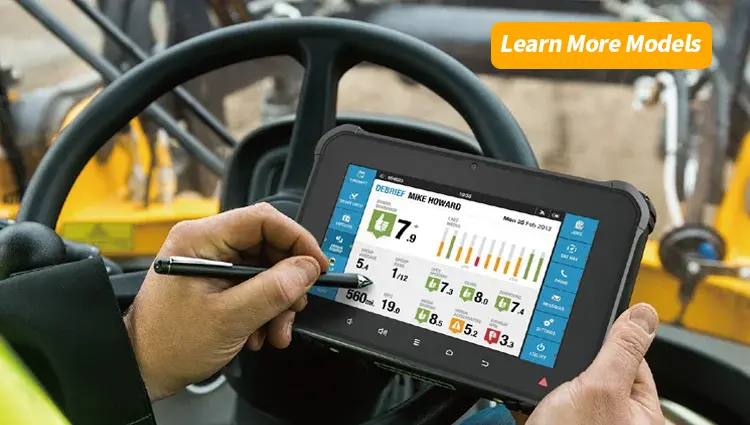Forklift Computer: Revolutionizing Warehouse Operations
In the fast-paced world of logistics and warehousing, efficiency is key. Forklift computers have emerged as game-changers in optimizing warehouse operations, offering real-time data, navigation assistance, and inventory management solutions. This article delves into the transformative power of forklift computers, detailing their features, benefits, and impact on modern supply chain management.
- Harnessing Technology for Efficiency
- Navigating the Warehouse with Precision
- Optimizing Inventory Management
- Enhancing Safety Standards
- Streamlining Maintenance Procedures
- Boosting Productivity and Efficiency
- Unlocking the Potential of IoT Integration
- Addressing Common Concerns
- FAQs (Frequently Asked Questions)
Harnessing Technology for Efficiency
Forklift computers, equipped with advanced technology, are revolutionizing traditional warehouse practices. These devices integrate seamlessly with forklifts, providing operators with a wealth of information at their fingertips. From inventory tracking to route optimization, forklift computers streamline operations, resulting in significant time and cost savings.
Navigating the Warehouse with Precision
One of the standout features of forklift computers is their navigation capabilities. By leveraging GPS and indoor mapping technology, these devices empower operators to navigate complex warehouse layouts with precision. Whether it’s locating specific inventory or identifying optimal routes, forklift computers enhance efficiency while reducing the risk of errors.
Optimizing Inventory Management
Effective inventory management is crucial for maintaining smooth warehouse operations. Forklift computers play a pivotal role in this aspect by providing real-time inventory tracking and visibility. Operators can instantly access inventory data, check stock levels, and locate items with ease, minimizing downtime and improving overall productivity.
Enhancing Safety Standards
Safety is paramount in any warehouse environment, and forklift computers are designed with this principle in mind. These devices feature built-in safety protocols, such as collision detection and proximity sensors, to prevent accidents and mitigate risks. By promoting safer operation practices, forklift computers contribute to a secure working environment for all warehouse personnel.
Streamlining Maintenance Procedures
Regular maintenance is essential for keeping forklifts in optimal condition. Forklift computers simplify this process by providing maintenance alerts and diagnostic reports in real-time. Operators can proactively address issues, schedule maintenance tasks, and ensure that forklifts remain operational with minimal downtime.
Boosting Productivity and Efficiency
By automating routine tasks and providing actionable insights, forklift computers enable warehouse operators to work more efficiently. With access to data-driven analytics and performance metrics, businesses can identify bottlenecks, optimize workflows, and maximize throughput. This increased productivity translates into tangible benefits, such as faster order fulfillment and improved customer satisfaction.
Unlocking the Potential of IoT Integration
Forklift computers serve as integral components of the Internet of Things (IoT) ecosystem in modern warehouses. Through seamless integration with other IoT devices and systems, such as inventory management software and RFID scanners, these computers facilitate data exchange and collaboration across various operational functions. This interconnectedness enhances visibility, agility, and responsiveness within the supply chain network.
Addressing Common Concerns
Despite the myriad benefits of forklift computers, some concerns may arise regarding implementation costs and training requirements. However, the long-term advantages far outweigh the initial investment, as forklift computers drive efficiency, accuracy, and safety in warehouse operations. Moreover, comprehensive training programs ensure that operators are proficient in using these devices effectively, minimizing any potential challenges during the transition period.
FAQs (Frequently Asked Questions)
How do forklift computers improve warehouse efficiency? Forklift computers enhance efficiency by providing real-time data, navigation assistance, and inventory management solutions. Operators can streamline operations, optimize routes, and track inventory with ease, resulting in time and cost savings.
Are forklift computers easy to integrate into existing warehouse systems? Yes, forklift computers are designed to seamlessly integrate with existing warehouse management systems (WMS) and IoT infrastructure. With proper configuration and compatibility checks, businesses can implement these devices without disrupting their operations.
What safety features do forklift computers offer? Forklift computers incorporate safety features such as collision detection, proximity sensors, and speed limit enforcement to prevent accidents and ensure operator safety. These advanced functionalities help mitigate risks and create a secure working environment in warehouses.
Can forklift computers improve inventory accuracy? Yes, forklift computers play a crucial role in enhancing inventory accuracy through real-time tracking and visibility. Operators can easily locate items, update inventory records, and minimize discrepancies, leading to improved inventory management practices.
How do forklift computers contribute to cost savings? By optimizing workflows, reducing downtime, and minimizing errors, forklift computers help businesses save costs associated with labor, maintenance, and inventory management. The increased efficiency and productivity translate into tangible financial benefits over time.
What are the key considerations for selecting a forklift computer? When choosing a forklift computer, businesses should consider factors such as compatibility with existing systems, durability, ease of use, and support services. Conducting thorough research and consulting with industry experts can aid in selecting the most suitable solution for specific operational needs.
Conclusion: In conclusion, forklift computers have emerged as indispensable tools for modern warehouse management, offering unparalleled efficiency, safety, and scalability. By harnessing the power of technology, businesses can optimize their operations, improve productivity, and stay ahead in today’s competitive market landscape. Embracing the transformative potential of forklift computers is not just a strategic choice but a necessity for driving sustainable growth and success in the logistics industry.








